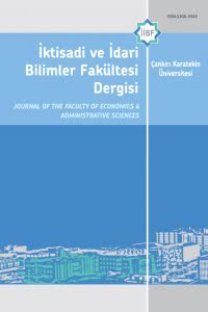Evaluating the Relationship between Concentration Indicators and Profitability of Banking Industry in Iran
İran'da Bankacılık Sektörünün Karlılığı ve Yoğunlaşma Göstergeleri Arasındaki İlişkinin Değerlendirilmesi*
___
- Akhigbe, J. & Mcnulty, J. (2005). Profit Efficiency Sources Differences Among Small and Larg U.S. Commercial Banks. Journal of Economics and Finance. 29(3), 289-299.
- Baltagi, H.B. (2005). Econometrics Analysis of panel Data, 3th Edition, USA: John Wiley & Sons Ltd.
- Bhattacharya, M. & Bloch, H. (2000). The Dynamics of Industrial Concentration in Australian Manufacturing. International Journal of Industrial Organization, 18, 11811199.
- Bhattacharya, M. (2002). Industrial Concentration and Competition in Malaysian Manufacturing. Applied Economics, 34, 2127-2134.
- Bikker, J., Sherrill, S. & Spierdijk, L. (2009). Assessing Competition with PanzarRoss Model: the Role of Scale, Costs and Equilibrium. Working Paper, de Nethlandsche bank.
- Bikker, J.A. (2004). Competition and Efficiency in a United European Banking Market. UK: Edward Elgar Publishing.
- Bikker, J.A. & Haaf, K. (2002). Competition, Concentration and their Relationship: An Empirical Analysis of the Banking Industry. Journal of Banking and Finance, 26, 2191-2214.
- Bjarni, J. (2007). Does the Size Matter? The Relationship between Size and Profitability of Icelandic Firms. Bifröst Journal of Social Sciences, 1, 43-55
- Claessens, S. & Djankov, S. (1999). Ownership Concentration and Corporate Performance in the Czech Republic. Journal of Comparative Economics, 27(3), 498-513.
- Ebadi, J. & Shahiki Tash, M.N.. (2004). Investigating the Structure of Export Industrial Markets of Selected Goods. Iranian Journal of Trade Studies, 31, 33-58.
- Ebadi, J. & Shahiki Tash, M.N. (2004). Investigating the Impact of Agricultural Markets Structure on the Iranian Foreign Exchange Earning. Economic Studies of University if Tehran Quarterly, 67, 61-90.
- Feeny, S. & Rogers, M. (1999). Market Share, Concentration and Diversification in Firm Profitability. Melbourne Institute Working Paper, 20-99.
- Goddard, J., Tavakoli, M. & Wilson, J.O.S. (2005). Determinants of Profitability in European Manufacturing and Service Sector: Evidence from Dynamic Panel Model. Applied Financial Economics, 15, 1269-1282.
- Hossaini, M. & Parme, Z. (2010). Evaluating Monopoly, Competition, and Concentration in the Iranian Poultry meat and eggs. Journal of Knowledge and Development, 30, 188- 214.
- Khalilzadehshirazi, J. (1974). Market Structure and PriceCost Margins in United Kingdom Manufacturing Industrial. The Review of Economics and Statistics, 56(1), 67-76.
- Jeong, K.Y. & Robert, T.M. (2003). A New Methodology Linking Concentration Dynamics to Current and SteadyState Profits: Examining Korean Industrial Policy during Take-off. International Journal of Industrial Organization, 21, 1489-1526.
- Khodadad Kashi, F. (2000). Monopoly, Competition and Concentration in the Industrial Markets of Iran, Iranian Journal Of Trade Studies, 15, 75-96.
- Khodad Kashi, F. (2001). Evaluating Power and Volume of Monopolistic Activities in the Iranian Economy. Institute for Trade Researches and Studies, Tehran, Iran.
- Li, H. & Luo, G. (2008). Industry Consolidation and Price in the US Linerboard Industry. Journal of Forest Economics, 14(21), 93 -115.
- Lerner, A.P. (1934). The Concept of Monopoly and the Measurement of Monopoly Power. The Review of Economic Studies, 1(3), 157-175.
- Molkan, J. (2011). Examining the effect of Concentration Ratio and Economies of Scale on the Profitability in the Iranian Industries. Iranian Journal of Economic Research, 58, 99-126.
- Mason, E.S. (1949). The Current Status of Monopoly Problem in the United States. Harvard Law Review, 62, 1265-1285.
- Pajoyan, J. & Shafiei, A. (2008). Analyzing Structure in Iranian Banking Industry: Application of Daivis U Index. Quantitative Economic Journal, 4, 81-105.
- Sadraei Johari, A. & Manochehri, M. (2012). Dynamics of Industrial Concentration in the Iranian Manufacturing industries. Journal of Economic Research and Policies, 63, 105-132.
- Yildirim, H. & Philippatos, G. (2006). Restructuring, Merging, Competitiveness in Latin America Banking Industry. Journal of Forest Economics, 16(12), 62-85.
- ISSN: 1308-5549
- Yayın Aralığı: 4
- Başlangıç: 2011
- Yayıncı: Çankırı Karatekin Üniversitesi
İhracata Dayalı Büyüme Hipotezi: Türkiye Uygulaması
İsmail KÜÇÜKAKSOY, İsmail ÇİFÇİ, Rabia İnci ÖZBEK
Capital Structure in an Emerging Stock Market: The Case of Turkey*
Engin AKMAN, Rasim Ilker GOKBULUT, Elif GOKBULUT, Halime NALIN TEMEL
Birkan BÜYÜKARIKAN, Ulukan BÜYÜKARIKAN
Türkiye’de İtfaiye Hizmetlerinin Örgütlenmesi ve Etkinliği Sorunu
Ömer YAVUZ, Şeniz ANBARLI BOZATAY
Ali BAYRAKDAROĞLU, Fırat Botan ŞAN
Amaghouss JABRANE, Ibourk AOMAR
Zeynep ÖZGÜNER, Hüseyin Sabri KURTULDU
